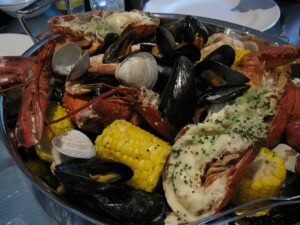By Janice Lindsay, Contributing Writer

The recipe for this meal begins “Dig a hole.”
Following a family tradition that began decades before I was born and lasted until well after I married and became a mother, my grandparents in northern Rhode Island hosted a family clambake at their home every Fourth of July. I think it was only Grandma’s love of “the bake” that kept it going.
A traditional clambake begins with a hole. Grandma so loved the bake that their back yard boasted a permanent bake pit. If I recall correctly, it was about six feet square. The backbreaking work of the bake was accomplished each year by whichever generation of men in our large extended family was most vigorous.
Here’s how I remember it: Take the protective lid off the hole whose bottom is lined with very large rocks. Build a wood fire on the rocks. Feed it for a couple hours until the rocks are hot. Brush embers aside and cover the hot stones with wet seaweed several inches deep. Place your food in burlap bags on top of the seaweed, alternating layers of bags with layers of seaweed. In the bags: clams, mussels, fish wrapped in foil, corn partially shucked, potatoes, onions. Spray it all with water. Cover it tightly with more seaweed and a wet tarpaulin and let the whole thing steam for an hour or more.
While waiting for the bake, eat Grandma’s traditional steaming hot clam chowder and just-out-of-the-fryer clam cakes. (Grandma’s Rhode Island chowder: a little salt pork, quahogs and their juice, tomato soup, potatoes, onions. That’s it.)
As a child, I wondered why such an arduous, heat-intensive custom as a clambake, with all food served steaming hot, developed on the Fourth of July, when the air might be so hot and humid that your eyeballs could sweat just reading the chowder recipe. Finally I realized that the tradition assumes you’re on a beach, with a cooling sea breeze, where you can easily dig a sand pit and find plenty of rocks, seaweed, and water. Our family tradition began with Grandma’s grandparents, who traveled to the shores of Narragansett Bay for their bake. Grandma made do without the beach.
I loved the chowder and clamcakes but found the messy bake food disgusting.

A few grown-ups seemed to relish scooping gritty wet quahogs out of their shells and slurping them down with gobs of melted butter. I suspect that everybody else, including Grandpa, would have been happier with a hot dog. But everybody put up with it, so as not to disappoint Grandma.
Grandma was short, stocky, and strong-willed, Grandpa tall and easy-going. They were solid, steady, dependable. I never saw them show affection to each other or anybody, but if one of us was in trouble or needed help, they were always there.
Grandma was indulgent with us grandchildren, but maybe she hadn’t been so patient with her own seven children, though they were obviously a happy family. The good-natured undercurrent was that our lives would be easier if we just did what she wanted. I never discovered the consequences of not doing so, because we all did.
Grandma’s greatest joy was having us all around her, especially at the clambake. We joked that if you didn’t show up, Grandma erased your name from the family Bible. Nobody wanted to be erased.
When Grandma died at the age of 95, her funeral took place during a Fourth of July holiday weekend. She had gathered us all together for one last obligatory Fourth.
Contact jlindsay@tidewater.net
RELATED CONTENT:
Fabulous Fourth of July celebrations in Massachusetts (fiftyplusadvocate.com)
Spring cleaning and the dusty mind (fiftyplusadvocate.com)
A guilty pleasure, but I don’t feel guilty (fiftyplusadvocate.com)
https://lobsteranywhere.com/seafood-savvy/host-clambake-party/









